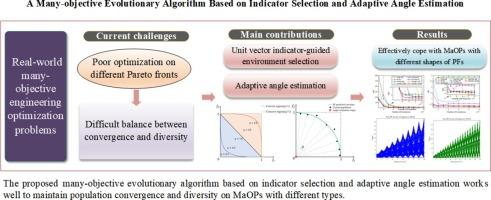A many-objective evolutionary algorithm based on indicator selection and adaptive angle estimation
IF 8.1
1区 计算机科学
0 COMPUTER SCIENCE, INFORMATION SYSTEMS
引用次数: 0
Abstract
Currently, real-world complex engineering problems often have more than three objectives that need to be optimized simultaneously. Existing algorithms for solving them mostly rely on the shape of the Pareto front to maintain diversity, which makes it difficult to effectively balance the convergence and diversity of the solutions. To address the above problems, a many-objective evolutionary algorithm based on indicator selection and adaptive angle estimation (MaOEA-ISAE) is proposed in this paper. Firstly, an environmental selection strategy based on a unit vector indicator is presented to split the retention of dominant individuals into two phases to balance the diversity and convergence of the population. Then, to preserve the diversity of the population, an adaptive angle estimation strategy based on Pareto front curvature prediction is developed to select individuals with good diversity in the dominant region. Besides, the algorithm has a simple evolutionary process, and no additional parameters are involved. Finally, the proposed MaOEA-ISAE is compared with seven other representative many-objective evolutionary algorithms on test instances of 3–20 objectives with different Pareto front shapes and real-world water resource management problem. The experimental results show that the proposed algorithm has an overall win rate of about more than 60 %, indicating a strong competitiveness on problems with different Pareto fronts.

基于指标选择和自适应角度估计的多目标进化算法
目前,现实世界中的复杂工程问题往往有三个以上的目标需要同时优化。现有的求解算法大多依靠帕累托前沿的形状来维持多样性,这就很难有效平衡解的收敛性和多样性。针对上述问题,本文提出了一种基于指标选择和自适应角度估计的多目标进化算法(MaOEA-ISAE)。首先,提出了一种基于单位向量指标的环境选择策略,将优势个体的保留分为两个阶段,以平衡种群的多样性和收敛性。然后,为了保持种群的多样性,本文提出了一种基于帕累托前沿曲率预测的自适应角度估计策略,以选择优势区域内具有良好多样性的个体。此外,该算法的进化过程简单,不涉及额外参数。最后,在具有不同帕累托前沿形状的3-20个目标的测试实例和现实世界的水资源管理问题上,比较了所提出的MaOEA-ISAE和其他七种具有代表性的多目标进化算法。实验结果表明,所提算法的总体胜率超过 60%,表明其在不同帕累托前沿的问题上具有很强的竞争力。
本文章由计算机程序翻译,如有差异,请以英文原文为准。
求助全文
约1分钟内获得全文
求助全文
来源期刊

Information Sciences
工程技术-计算机:信息系统
CiteScore
14.00
自引率
17.30%
发文量
1322
审稿时长
10.4 months
期刊介绍:
Informatics and Computer Science Intelligent Systems Applications is an esteemed international journal that focuses on publishing original and creative research findings in the field of information sciences. We also feature a limited number of timely tutorial and surveying contributions.
Our journal aims to cater to a diverse audience, including researchers, developers, managers, strategic planners, graduate students, and anyone interested in staying up-to-date with cutting-edge research in information science, knowledge engineering, and intelligent systems. While readers are expected to share a common interest in information science, they come from varying backgrounds such as engineering, mathematics, statistics, physics, computer science, cell biology, molecular biology, management science, cognitive science, neurobiology, behavioral sciences, and biochemistry.
 求助内容:
求助内容: 应助结果提醒方式:
应助结果提醒方式:


